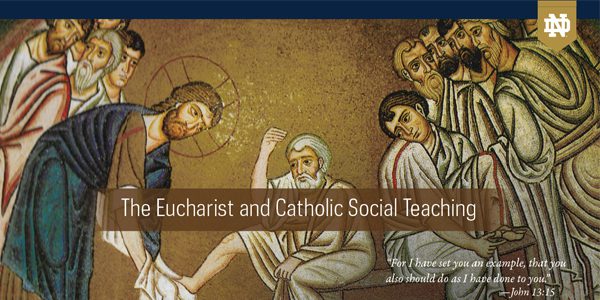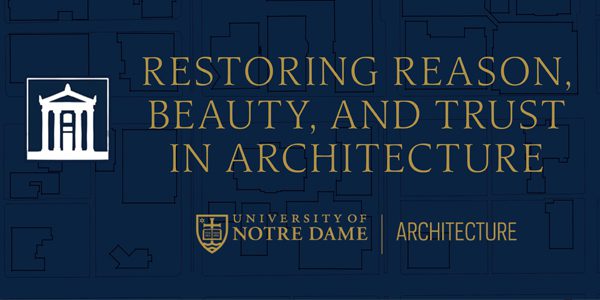London Book Club – London in Song: “A Nightingale Sang In Berkeley Square”
Subscribe to the ThinkND podcast on Apple, Spotify, or Google.
Featured Speakers:
- Ian Newman, Professor in the English Department and Fellow of the Keough-Naughton Institute for Irish Studies and of the Nanovic Institute for European Studies, University of Notre Dame
- Rev. Jim Lies C.S.C., Senior Director for Academic Initiatives and Partnerships for the Notre Dame London Global Gateway, University of Notre Dame
For the fourth and final week of the “London in Song” series, we began once again with an introduction by Rev. Jim Lies, C.S.C., Senior Director for Academic Initiatives and Partnerships, Notre Dame London Global Gateway. After a brief thank you for our sponsors and behind-the-scenes team, Fr. Lies set out the structure of the London Book Club, explaining how the group analyzes a new song each week that pertains to the history of London. He went on to introduce the speaker for the series, Ian Newman, an Assistant Professor in the University of Notre Dame’s English Department.
Newman began by reflecting on last week’s discussion of the song “Jerusalem” and its conservative and radical adaptations. In comparison, Newman explained that the adaptations of “A Nightingale Sang in Berkeley Square” vary very little in terms of lyrics and musical arrangement. He thinks that this reveals something interesting about mainstream music in the 20th century and beyond. To demonstrate this, Newman played the Nat King Cole version of the song, which has a lot in common with the Vera Lynn version participants were asked to listen to in advance of the session. After playing the song Newman reflected briefly on how the orchestra echoes the sound of a nightingale.
Newman went on to explain that “A Nightingale Sang in Berkeley Square” showed that mainstream and popular music in the 20th century became much more respectable. Instead of being marked as “the art of the poor,” popular music became much more bourgeois and elite, a trend which began in the late 19th century and continued throughout the late 20th century,
Newman moved on to recap some of the videos he had produced for the session. He described the history of Berkeley square, and that it was only just beginning to be urbanised when Michael Arlen’s short story was written, on which the song was based. Newman went on to talk about Berkeley Square as a prestigious and luxurious area of London, in sharp contrast to the areas that surrounded it, which have traditionally been associated with the poor, fitting in with the trend towards respectability of mainstream song.
The presentation then moved to think about the symbol of the Nightingale, which had traditionally been associated with ideas of spring, nighttime and mourning in historical literature and song. By the time that Arlen wrote his story, the symbol of the Nightingale had become hackneyed and cliched, meaning that it was only used in an ironic or sarcastic fashion. Newman described how in Arlen’s story the use of Berkeley square is to represent the boredom and ennui of the spiritually impoverished characters, and the nightingale singing is a symbol that has become so potent that it has become meaningless.
Newman explained that Eric Maschwitz claimed to have found the title of the short story and wrong a song based solely on that. When Nat King Cole adapts it, it becomes slow tempo and seems to suggest that romance is powerful it can turn the world on its head, and even a nightingale could in fact sing in Berkeley Square. Maschwitz and Manning were songwriters for the West End, and their music became the soundtrack for the blitz, giving this song a nostalgic and patriotic status in British culture.
The group then split out into breakout rooms to come up with questions for Newman, which were as follows:
- Are there any punk versions? Several of the groups talked about knowing London in the 80s and they certainly missed a version that was different from the romantic ones and are wondering if there are any out there?
- The song remained much more stable than others discussed in this course, why do you think that is? Did copyright prevent people from adapting it?
- Did the fact that this was available to buy make it more stable as it didn’t have to rely on the oral tradition and memory?
- How would you describe the relationship of the song and Arlen’s short story? Does it matter that the song originated from the short story?
Lastly, Fr. Lies closed out the meeting by thanking the audience, partners and team for their participation in the series. He then opened the community circles for those who would like to stay for extra discussion.
Visit the event page for more.
- Adaptations of “A Nightingale Sang in Berkeley Square” vary very little in terms of lyrics and musical arrangement. This reflects a change in mainstream music culture in the 20th century, as it moves away from being seen as an art form of the poorer classes to something more bourgeois. (Ian Newman 6:32)
- The nightingale historically represented spring, nighttime and mourning in literature and song, but became a cliched image that was only used in an ironic fashion by the time Michael Arlen wrote his short story. (Ian Newman 20:22)
- By the time you get to the 20th century, and by the time Michael Allen writes the short story, the nightingale has already become an old cliched hackneyed image that you can’t use unless it’s dripping with irony.” (Ian Newman 23:40)
- Eric Maschwitz claims to have written the song based on the title alone, but it is interesting that he was drawn to that title. Maschwitz and Manning Sherwin wrote music for the West End, and much of their music was used during the blitz. It has therefore gained a sentimental, almost patriotic character (Ian Newman 28:08)
- “Compared with something like ‘Sam Hall’ or ‘Jack Hall’ where the versions are wildly different, ‘A Nightingale Sings Berkeley Square’ always has the same set of words. The musical arrangements are slightly different in each case but, broadly speaking, is very identifiable.” (Ian Newman 6:41)
- “A Nightingale Sang in Berkeley Square, directly brings home this idea that we’re no longer talking about the gallows, the gin palaces, the places where criminals get dragged along the streets. This is not the mainstream music of the urban poor and the criminal classes, this is something that is extremely bourgeois, that is enjoying its sense of its own eliteness.” (Ian Newman 15:23)
- “Mainstream popular song is trying to make itself seem respectable, not necessarily consciously in the song itself, but as part of the general historical trend of where popular mainstream music is going.” (Ian Newman 19:52)
- “It is interesting that the deeply ironic image of the Nightingale singing in Berkeley square greatly appealed to the songwriter.” (Ian, Newman 27:54)
- “This is the music that was playing when German bombers were flying over and destroying London, and so it becomes a really powerful, nostalgic, and almost patriotic song for a version of London that is under threat.” (Ian Newman 29:20)
Related Content
Eucharistic Abundance and Social Regeneration
In 2022, the United States Conference of Catholic Bishops (USCCB) announced that the Church in this country would undertake a Eucharistic Revival, as a way to bolster Catholics’...
View EventHow Cities Speak To Us
Professor Emily Talen joins the School of Architecture to share her work at The Urbanism Lab and its focal point at the University of Chicago for the study of the built...
View EventThe Black National Anthem & Parent’s Signing Off On Children Reading Black Books
In this week’s episode, Isaiah and Tykiera talk about some tweets about Black people that took Twitter by storm. They also talk about The Black National Anthem, Lift Every Voice...
watch video


